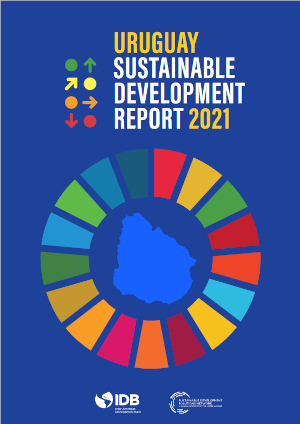Executive Summary
The world is still in the midst of the worst public health crisis in a century. Mobility restriction measures taken to respond to the COVID-19 threat have led to a global economic crisis, with massive job losses and major impacts amounting to a significant setback in the world’s progress towards achieving the SDGs, especially for poor countries and vulnerable population groups. In line with SDG 3 (Good Health and Well-Being), all countries need to strengthen the resilience of their health systems and their disease and pandemic prevention programs. Besides greater investments, the crisis has highlighted the need for better measurement and reporting to track disease and pandemic prevention programs, healthcare system preparedness, and resilience to pandemics.
This report presents a special edition of the SDG Index and Dashboards, in which Uruguay is benchmarked against OECD countries using a specific set of SDG indicators available for these countries. Due to time lags in data generation and reporting, however, the SDG Index and Dashboards for Uruguay do not reflect the impact of COVID-19. The projection of country trajectories based on recent progress (business-as-usual scenarios) may therefore not provide a realistic sense of the likely future, as COVID-19 is likely to alter trajectories relating to many SDGs. Nevertheless, the Index and Dashboards remain useful for understanding, goal by goal, the progress of Uruguay compared to these other countries. The SDG data and the Six Transformations Framework presented in this report help to identify the key vulnerabilities and challenges that Uruguay was facing before the COVID-19 crisis and provide a useful framework to inform its long-term recovery from COVID-19.
Uruguay ranks 30th of the 39 countries covered in this special edition. Its overall score is, however, above the average for OECD countries in the Latin America and Caribbean region and only slightly below the population-weighted average of OECD countries overall. Uruguay performs well and is showing progress on most of the socio-economic goals (SDGs 1–10) although progress is lagging on SDG 4 (Quality Education), SDG 9 (Industry, Innovation and Infrastructure) and SDG 10 (Reduced Inequalities). As with other OECD countries, and particularly the OECD countries in the Latin America and Caribbean region, further effort is needed to meet goals related to sustainable consumption and production, or to climate and biodiversity (SDGs 12 to 15), and to address governance and security issues covered under SDG 16 (Peace, Justice and Strong Institutions).
As part of its commitment to the 2030 Agenda, Uruguay has already submitted four voluntary national reviews to the UN High Level Political Forum: in 2017, 2018, 2019 and 2021. Incorporating exhaustive statistical data, these comprehensive reports show Uruguay’s progress on the 17 SDGs and provide detailed information on regulatory frameworks and specific actions contributing to progress towards each goal. The government’s recent submission of the 2021 voluntary national review, which incorporates the results in this report, presents an opportunity to reinforce Uruguay’s commitment to the 2030 Agenda by defining strategies to address remaining challenges and further accelerate progress.
Reliable, relevant and timely information is essential to successfully align national strategies to the SDGs: to identify priorities, mobilize resources, measure results and ensure transparency. Uruguay must encourage and advance the strategic use of data and digital technologies towards improving its policies for sustainable development.
Achieving the SDGs requires closing the financing gap. The private sector plays a key role in mobilizing resources for sustained economic growth and contributing to social inclusion and environmental protection. The private sector contributes directly to SDG 12 (Responsible Consumption and Production) and indirectly, through its actions and financing, to the achievement of all 17 SDGs. Uruguay has already started to move in this direction, initiating the country’s first private issuance of green bonds to finance sustainable investment portfolios. Uruguay’s Central Bank has now joined the Network for Greening the Financial System, and the Uruguayan Private Banks Association has established a sustainability committee to accelerate the transition towards sustainable finance in the banking system.
Citation
IDB & SDSN, 2021. Uruguay Sustainable Development Report 2021. Inter-American Development Bank and Sustainable Development Solutions Network: Washington, D.C. and Paris
